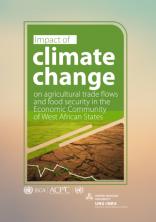Impact of climate change on agricultural trade flows and food security in the Economic Community of West African States

The impact of climate change on agriculture is expected to have a profound effect on the African continent if nothing is done to reduce greenhouse gas emissions and if no appropriate adaptation strategies are put in place (Intergovernmental Panel on Climate Change, 2014; Rosenzweig and Parry, 1994). There is now consensus that reductions in these emissions require global agreements between industrialized countries emitting large quantities of those gases. Regardless of whether agreements are concluded to reduce emissions to limit global temperature increases to less than 2oC by 2100, adaption measures must be expediently formulated in order to reduce the impact of emissions on food security in countries located in the tropics. It goes without saying that African countries must also take the steps required to reduce emissions and must adopt appropriate mitigation strategies, including by promoting reforestation and investing in cleaner and renewable energies. Given that climate models predict that an increase in temperatures will be accompanied with uneven changes in precipitation levels around the world, however, some countries may experience more rainfall than others. Consequently, while some countries may experience good crop harvests, others may not. In such a scenario, food trade among countries may help to combat food insecurity. The present report focuses on the West Africa region as a case study and is intended to deepen understanding of the relationship among the region’s climate, agricultural production, food trade and food security. In a previous study, it was established that countries located in the northern hemisphere will be only marginally affected by climate change in terms of their ability to produce agricultural food products (Rosenzweig and Parry, 1994), while agricultural food production in countries located in the southern hemisphere, especially in the tropics, will be much more seriously affected. Specific countries in that hemisphere may fare better than others, however. It is therefore possible that regional trade and food imports from the northern hemisphere will become critically important if countries in the southern hemisphere are to address the negative effects of climate change (Stephan and Schenker, 2008).